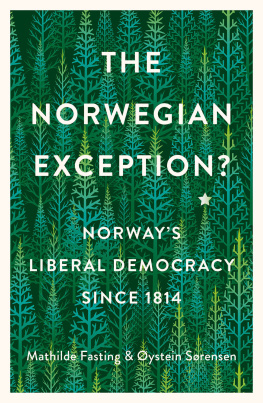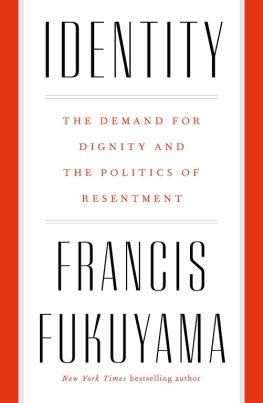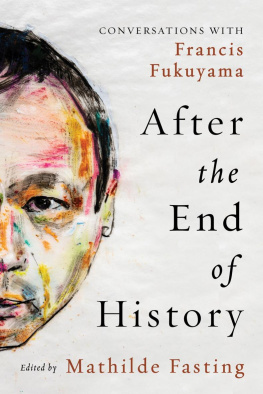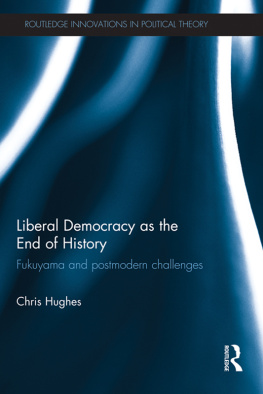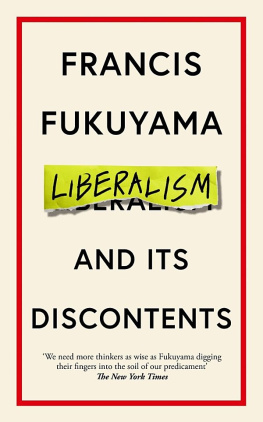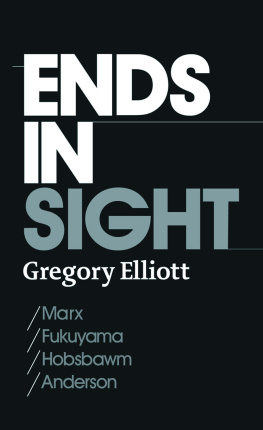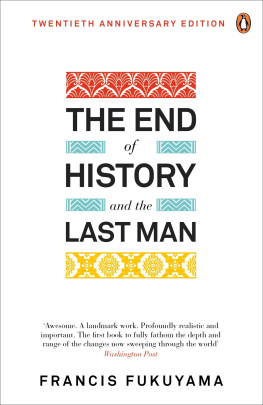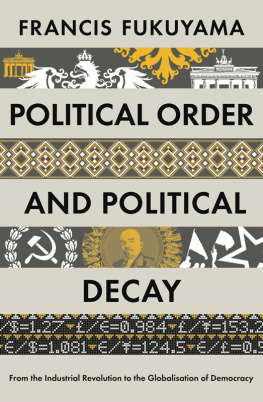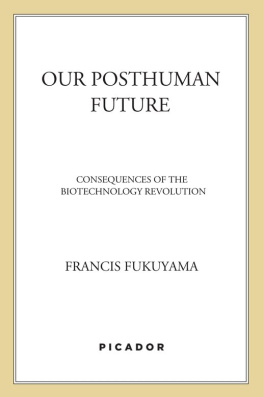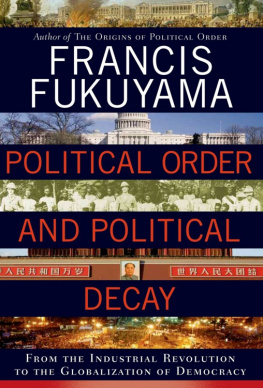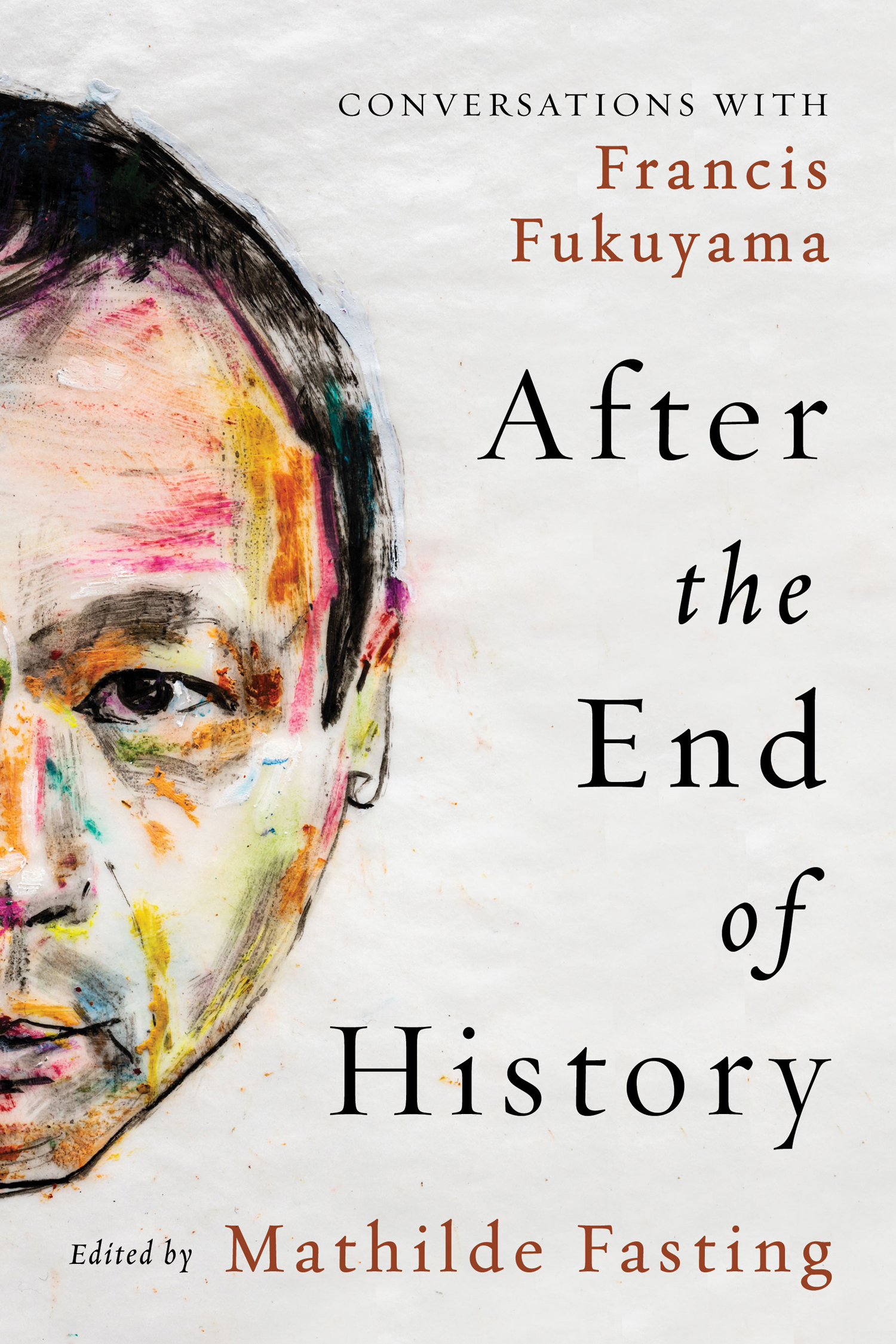Contents
Page List
Acknowledgments
First of all, I wish to thank Francis Fukuyama for spending many hours talking to me and for accepting my suggestion to come to Stanford for the first important session of talks. It has been a privilege to become acquainted with Frank, as he is known among his friends, and to follow up our talks during his stay in Oslo in February 2020, just before the world was hit by COVID-19 and all travel was banned. I must also thank him for contributing in the editing process with valuable comments and clarifications.
Second, I must express my gratitude to Georgetown University Press and especially to the director, Al Bertrand. His comments and suggestions have been encouraging, and his support throughout the editing process has been particularly valuable, making sure that the manuscript became both timeless and relevant. The editing process took place during the first phase of the pandemic of COVID-19 when both Norway and the United States were in lockdown. I must admit that incorporating the pandemic into the manuscript has been challenging, but I hope the result is acceptable. It was hard to predict the fall of the Berlin Wall but maybe even harder to foresee that this pandemic would paralyze the world.
This project started out as a small book in Norwegian, based on a version of my original Norwegian manuscript and the Stanford interviews in 2019. I wish to thank the Norwegian editor of that book, Edvard Thorup at Dreyer, for encouraging me to contact Fukuyama for those interviews. I owe a special thanks to Jeff Gedmin, editor in chief and chief executive of American Purpose, for letting me use the title of the commemorating interview thirty years after the fall of the wall, The Future of History, and for his belief in this project.
A special thanks to Franks good friend Professor Dan Banik, who invited me to a private lecture and small dinner in Oslo in February 2018 with Fukuyama and also to different venues during Fukuyamas stay in Oslo in 2020, and to Ole Egil Andreassen for ideas, support, and valuable contacts. I wish to thank Hallvard Sandven for his careful reading of my interview guide and later drafts of this book. Torbjrn Lindstrm Knutsen gave me valuable comments and support, and Helena Rosenblatt commented on the text and inspired me to focus on classical liberalism. I also wish to thank Branko Milanovi, who reminded me that the end of the Cold War was not a time of happiness in his native country, Serbia and Yugoslavia, and took the time to explain and elaborate his views on economic history and institutions.
Finally, my daughter, Agnes; my son, Peder; and my husband, Lars have supported me all the timethank you.
ONE
What Has Happened after the End of History?
In the current political context, there are many dark clouds. The question is whether liberal democracies will prove themselves capable in rainy days. The 2016 election of Donald Trump, Brexit, and the rise of populism in Europe are contributing to a more unstable and uncertain future, and the rise of China is altering the global balance of power. How does this influence liberal democracies?
Liberal Democracies Are Taken for Granted
We have in the West been taking liberal democracy more or less for granted for the past fifty years. What has happened after the end of history? Why do we need this conversation now?
I think you are right. In the United States nobody has really felt threatened. The basic constitutional system has worked for a very long time. Richard Nixon challenged it, and that led to his resignation and the whole Watergate scandal, but, in a sense, I dont think that the threat he posed to the system was nearly as great as the one that Donald Trump poses. Nixon never openly tried to undermine his own Justice Department or the FBI. He denied that he was guilty of the things that he was accused of. He lied about things, but he didnt say the whole effort to hold the president accountable was a big hoax or a big fraud. With Trump it is different, and I think that this kind of disrespect for legal and constitutional institutions is really spreading to too many parts of the world. He likes to attack existing institutions. And I think this is a very dangerous tendency.
In your books about political order, you have talked about the miracle of modern liberal democracy, in which strong states capable of enforcing law are nonetheless checked by law and by legislatures, finding a balance of power that made no one dominant and forcing all to compromise. People living in liberal democracies will have a sense of what they are, but it is useful to repeat and clarify. Let us start by defining liberal democracies: what are they?
Well, in my view a liberal democracy is three separate institutions. One of them is a modern state, meaning a state that is capable of actually delivering services and protecting the country both internally and externally. The second institution is a rule of law that limits the power of the state so that the state only behaves lawfully according to rules that are agreed upon by the community. The third set of institutions are the ones of democratic accountability that make sure that the state reflects the interests of the whole people.
Ultimately, an important part of liberal democracy is a combination of liberal institutions that limit power and treat citizens fairly and democratic ones that respond to the will of the population. Those two are not necessarily aligned with one another. The other thing thats very difficult to achieve is balance because, on the one hand, you want a state that is strong enough to be able to actually do thingsto enforce laws and arrest criminals and so forthbut, on the other hand, you dont want it to be so strong that it violates the rights of its citizens. And somehow you have to have both a strong state that can constrain and at the same time let people lead their lives. This balance is important.
You are preoccupied with the value of the modern state. Why?
Liberal democracies are also modern states capable of delivering services, rules of law that limit the power of the state, and democratically accountable institutions. Of those, democracy is the easiest to achieve. It is not that difficult to hold elections and get a sense of what the people want. A modern, impersonal state and the rule of law are much more difficult to create. What I think is incredibly common all over the world is a state that delivers services only to people who are supporters of a particular political leader. In other words, the state is not impersonal; its full of patronage, and corruption sometimes reaches grotesque levels. Sometimes its captured by military gangs, by families, or by other people, and the state simply ceases functioning. The state is becoming personal instead of being impersonal. I think the impersonality part is really difficult to achieve. A modern state does not treat individuals differently depending on whether youre a friend of the ruler or a relative or something of that sort. Impersonality is something that many countries fail to achieve. This is the argument I tried to make in my two books about political order: that its hard to achieve because its not very natural. Your natural instinct is to favor your friends and family, so its not surprising that corruption keeps coming back. Thats why I think that the modern state is fragile. It is a miracle, and it is fragile.
Why is it a miracle?
I think that a modern democracy is a balancing act. On the one hand, you have to have a state. A state is all about power. Its an institution that aggregates and concentrates power and allows the state to enforce laws to defend the community against outsiders to police behavior on the inside. But once you create this powerful state, you need to constrain it, and we do that through the rule of law and also through democracy, which makes the state obedient to the wishes of at least a good proportion of the population. Having that balance is something thats very hard to achieve. Some societies suffer from having no state or a weak state, and others suffer from having an excessively strong state. To get that balance I do think is a bit of a political miracle because we are usually preferring to be friends with our friends, and then not so good friends with people further away from us.


